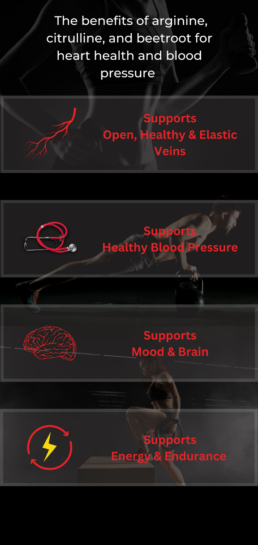Discover the Power of Natural Supplements and Exercise for Better Heart Health and Lower Blood Pressure
Are you on a quest for better heart health? Do you want to explore natural ways to lower your blood pressure? This article will delve into three powerful natural supplements: arginine, citrulline, and beetroot. We will explore their health benefits, impact on blood pressure, and how they can be easily incorporated into your daily routine. We will also discuss how exercise is important in supporting cardiovascular health.
The Importance of Blood Pressure Management
Blood pressure is a crucial indicator of overall cardiovascular health. It refers to the force exerted by blood against the walls of your arteries as your heart pumps it around your body. High blood pressure, or hypertension, is a silent killer, as it often has no symptoms. If untreated, hypertension can lead to severe health problems, including heart attack, stroke, and kidney failure.
Arginine: The Powerhouse Amino Acid
Arginine is a semi-essential amino acid that plays a vital role in many bodily functions, including cell division, wound healing, and removing ammonia from the body. It is also a precursor to nitric oxide (NO), a molecule that promotes blood vessel relaxation, improving blood flow and lowering blood pressure.
The benefits of arginine may extend to the cardiovascular system. Some studies have shown that arginine supplementation may effectively reduce blood pressure in people with hypertension.
Arginine is a semi-essential amino acid that serves as the primary building block for nitric oxide synthesis. Nitric oxide is a key signaling molecule that helps regulate blood flow, blood pressure, and overall vascular health. It does this by relaxing the smooth muscle cells lining blood vessels, which in turn allows for improved blood flow and reduced blood pressure.
Several studies have demonstrated that supplementing with arginine can increase nitric oxide production, resulting in better blood flow, blood pressure regulation, and overall cardiovascular health.
Citrulline: The Unsung Hero
Citrulline is another amino acid that may have impressive cardiovascular benefits. As mentioned earlier, it is converted into arginine in the body, which is then transformed into nitric oxide. Citrulline supplements may help enhance blood flow and reduce blood pressure by increasing nitric oxide production. In addition to its blood pressure-lowering effects, citrulline has been shown to improve exercise performance and reduce muscle soreness.
Beetroot: The Natural Blood Pressure Regulator
Beetroot is a nutritious vegetable with numerous health benefits, including improved blood pressure regulation. It is rich in nitrates, which are converted into nitric oxide in the body, promoting blood vessel dilation and reducing blood pressure.
Research has shown that drinking beetroot juice or taking beetroot supplements can help lower blood pressure in individuals with hypertension. Moreover, beetroot is also high in antioxidants, fiber, and essential nutrients, contributing to overall health and well-being.
Beetroot is a rich source of dietary nitrates, which are natural compounds that can be converted into nitric oxide within the body. This conversion process occurs through a series of reactions involving the reduction of nitrates to nitrites and finally to nitric oxide. Nitric oxide, as previously discussed, is essential for blood vessel dilation, improved blood flow, and blood pressure regulation.
Exercise To Lower Your Blood Pressure
Supports cardiovascular health:
Regular physical activity strengthens the heart and improves its efficiency in pumping blood. A stronger heart can pump more blood with less effort, reducing the force on the artery walls and lowering blood pressure.
Promotes weight loss:
Exercise helps maintain a healthy weight, which is crucial for blood pressure management. Excess weight can strain the heart and blood vessels, leading to high blood pressure.
Supports vasodilation:
Exercise promotes the release of nitric oxide, a molecule responsible for relaxing blood vessels, resulting in improved blood flow and reduced blood pressure.
Reduces stress:
Engaging in regular physical activity can help alleviate stress, which is known to contribute to high blood pressure. Exercise stimulates the production of endorphins, the body’s natural “feel-good” chemicals, helping to reduce stress levels.
Breathing
Activates the relaxation response: Proper breathing techniques, such as deep and slow breathing, can activate the body’s relaxation response, mediated by the parasympathetic nervous system. This relaxation response helps lower heart rate and blood pressure.
Reduces stress and anxiety: Deep breathing exercises can help alleviate stress and anxiety, significantly contributing to high blood pressure. By focusing on one’s breath, the mind is redirected away from stressors and allows the body to relax.
Improves oxygenation: Proper breathing ensures that the body receives an adequate supply of oxygen, which is essential for maintaining healthy blood pressure levels. Oxygen-rich blood can help the heart function more efficiently and reduce the workload on the cardiovascular system.
Enhances blood circulation: Deep breathing can improve blood circulation by assisting the movement of oxygen-rich blood throughout the body. Improved circulation can help lower blood pressure and promote overall cardiovascular health.
In conclusion, exercise and proper breathing techniques are vital for lowering blood pressure because they help improve cardiovascular health, reduce stress, enhance vasodilation, and promote blood circulation. Incorporating regular physical activity and practicing mindful breathing into your daily routine can contribute significantly to better blood pressure management and overall health.
Want to know more?
Here are ten studies related to arginine, citrulline, and beetroot and their effects on blood pressure:
- Böger, R. H., Bode-Böger, S. M., Thiele, W., Junker, W., Alexander, K., & Frölich, J. C. (1998). Restoring vascular nitric oxide formation by L-arginine improves the symptoms of intermittent claudication in patients with peripheral arterial occlusive disease. Journal of the American College of Cardiology, 32(5), 1336-1344. URL: https://www.sciencedirect.com/science/article/pii/S0735109798003220
- Cormio, L., De Siati, M., Lorusso, F., Selvaggio, O., Mirabella, L., Sanguedolce, F., & Carrieri, G. (2011). Oral L-citrulline supplementation improves erection hardness in men with mild erectile dysfunction. Urology, 77(1), 119-122. URL: https://www.sciencedirect.com/science/article/abs/pii/S0090429510006249
- Coles, L. T., & Clifton, P. M. (2012). Effect of beetroot juice on lowering blood pressure in free-living, disease-free adults: a randomized, placebo-controlled trial. Nutrition Journal, 11(1), 106. URL: https://nutritionj.biomedcentral.com/articles/10.1186/1475-2891-11-106
- Figueroa, A., Wong, A., Jaime, S. J., & Gonzales, J. U. (2017). Influence of L-citrulline and watermelon supplementation on vascular function and exercise performance. Current Opinion in Clinical Nutrition & Metabolic Care, 20(1), 92-98. URL: https://journals.lww.com/co-clinicalnutrition/Abstract/2017/01000/Influence_of_L_citrulline_and_watermelon.14.aspx
- Hord, N. G., Tang, Y., & Bryan, N. S. (2009). Food sources of nitrates and nitrites: the physiologic context for potential health benefits. The American Journal of Clinical Nutrition, 90(1), 1-10. URL: https://academic.oup.com/ajcn/article/90/1/1/4596750
- Kloner, R. A., Shi, J., Dai, W., & Prendergast, B. D. (2019). Cardiovascular safety of phosphodiesterase type 5 inhibitors after nearly 2 decades on the market. Cardiovascular Drugs and Therapy, 33(5), 629-640. URL: https://link.springer.com/article/10.1007%2Fs10557-019-06896-0
- Pahlavani, N., Jafari, M., Sadeghi, O., Rezaei, M., Rasad, H., & Rahdar, H. A. (2017). L-arginine supplementation and risk factors of cardiovascular diseases in healthy men: a double-blind randomized clinical trial. F1000Research, 6, 2162. URL: https://f1000research.com/articles/6-2162/v2
- Schwedhelm, E., Maas, R., Freese, R., Jung, D., Lukacs, Z., Jambrecina, A., … & Böger, R. H. (2008). Pharmacokinetic and pharmacodynamic properties of oral L-citrulline and L-arginine: impact on nitric oxide metabolism. British Journal of Clinical Pharmacology, 65(1), 51-59. URL: https://bpspubs.onlinelibrary.wiley.com/doi/full/10.1111/j.1365-2125.2007.02990.x
- Siervo, M., Lara, J., Ogbonmwan, I., & Mathers, J. C. (2013). Inorganic nitrate and beetroot juice supplementation reduces blood pressure in adults: a systematic review and meta-analysis. The Journal of Nutrition, 143(6), 818-826. URL: https://academic.oup.com/jn/article/143/6/818/4571554
- Sureda, A., Córdova, A., Ferrer, M. D., Tauler, P., Pérez, G., Tur, J. A., & Pons, A. (2010). L-citrulline-malate influence over branched-chain amino acid utilization during exercise. European Journal of Applied Physiology, 110(2), 341-351. URL: https://link.springer.com/article/10.1007%2Fs00421-010-1509-4
These studies focus on various aspects of arginine, citrulline, and beetroot supplementation in relation to blood pressure, including their impact on nitric oxide metabolism, cardiovascular health, and exercise performance. By reviewing these studies, you can better understand the potential benefits of these compounds for blood pressure management and overall health.

